Business Environment: Fiscal, Monetary Policies, CSR, and Social Media
VerifiedAdded on 2023/01/03
|8
|2665
|46
Report
AI Summary
This report investigates the intricate relationship between the business environment and the social media sector, focusing on the impacts of fiscal and monetary policies, as well as corporate social responsibility (CSR) and ethics. The analysis delves into how government policies, including changes in tax rates and expenditures, and interest rates affect social media platforms and their marketing strategies. Furthermore, the report explores how CSR initiatives and ethical considerations shape the activities of various organizations within the social media landscape, examining case studies of companies like Facebook, Twitter, YouTube, TikTok and LinkedIn. It also highlights the challenges and risks associated with social media, such as privacy concerns and ethical dilemmas, concluding with an overview of the social media sector's evolution in the context of these economic and ethical factors.
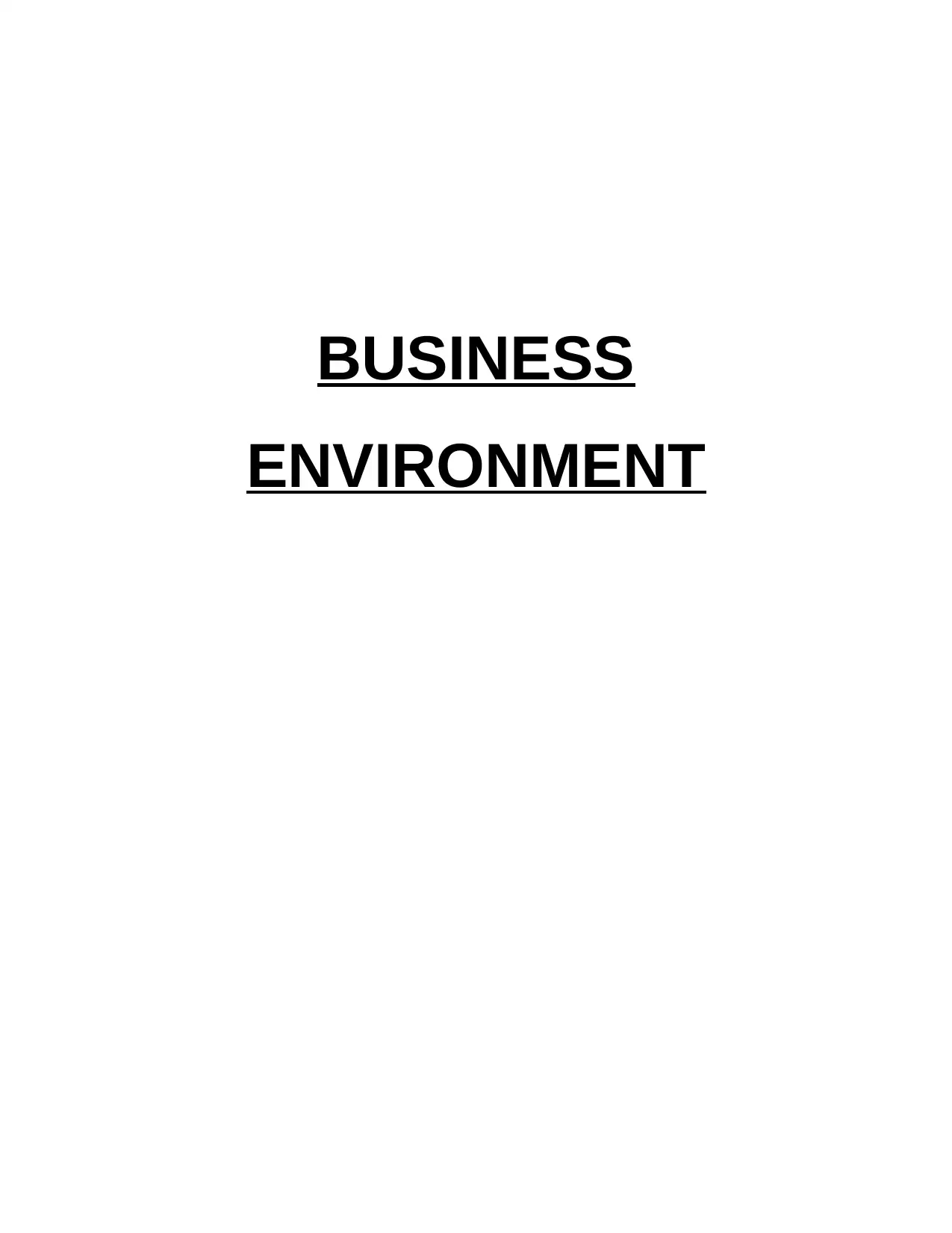
BUSINESS
ENVIRONMENT
ENVIRONMENT
Paraphrase This Document
Need a fresh take? Get an instant paraphrase of this document with our AI Paraphraser
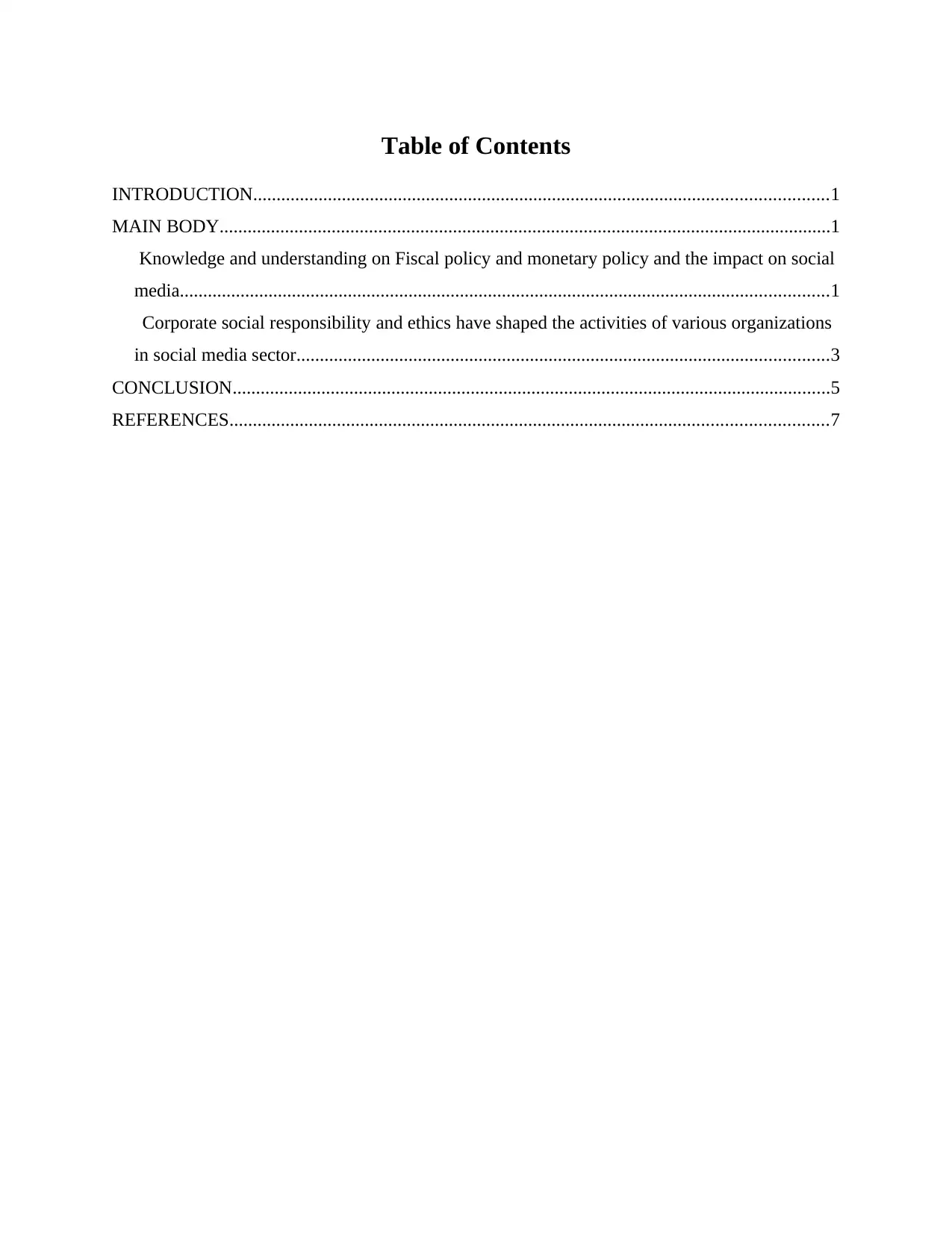
Table of Contents
INTRODUCTION...........................................................................................................................1
MAIN BODY...................................................................................................................................1
Knowledge and understanding on Fiscal policy and monetary policy and the impact on social
media...........................................................................................................................................1
Corporate social responsibility and ethics have shaped the activities of various organizations
in social media sector..................................................................................................................3
CONCLUSION................................................................................................................................5
REFERENCES................................................................................................................................7
INTRODUCTION...........................................................................................................................1
MAIN BODY...................................................................................................................................1
Knowledge and understanding on Fiscal policy and monetary policy and the impact on social
media...........................................................................................................................................1
Corporate social responsibility and ethics have shaped the activities of various organizations
in social media sector..................................................................................................................3
CONCLUSION................................................................................................................................5
REFERENCES................................................................................................................................7
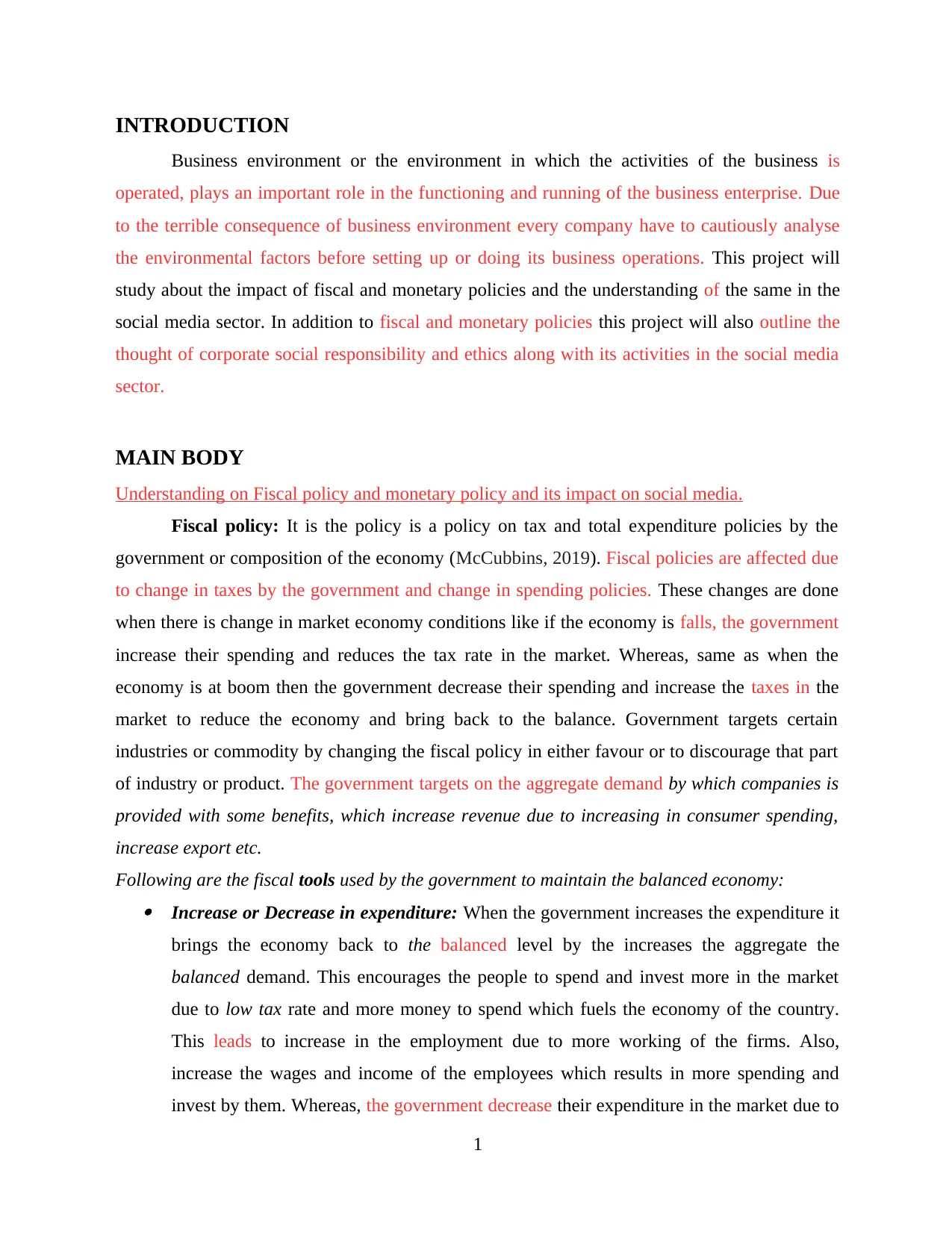
INTRODUCTION
Business environment or the environment in which the activities of the business is
operated, plays an important role in the functioning and running of the business enterprise. Due
to the terrible consequence of business environment every company have to cautiously analyse
the environmental factors before setting up or doing its business operations. This project will
study about the impact of fiscal and monetary policies and the understanding of the same in the
social media sector. In addition to fiscal and monetary policies this project will also outline the
thought of corporate social responsibility and ethics along with its activities in the social media
sector.
MAIN BODY
Understanding on Fiscal policy and monetary policy and its impact on social media.
Fiscal policy: It is the policy is a policy on tax and total expenditure policies by the
government or composition of the economy (McCubbins, 2019). Fiscal policies are affected due
to change in taxes by the government and change in spending policies. These changes are done
when there is change in market economy conditions like if the economy is falls, the government
increase their spending and reduces the tax rate in the market. Whereas, same as when the
economy is at boom then the government decrease their spending and increase the taxes in the
market to reduce the economy and bring back to the balance. Government targets certain
industries or commodity by changing the fiscal policy in either favour or to discourage that part
of industry or product. The government targets on the aggregate demand by which companies is
provided with some benefits, which increase revenue due to increasing in consumer spending,
increase export etc.
Following are the fiscal tools used by the government to maintain the balanced economy: Increase or Decrease in expenditure: When the government increases the expenditure it
brings the economy back to the balanced level by the increases the aggregate the
balanced demand. This encourages the people to spend and invest more in the market
due to low tax rate and more money to spend which fuels the economy of the country.
This leads to increase in the employment due to more working of the firms. Also,
increase the wages and income of the employees which results in more spending and
invest by them. Whereas, the government decrease their expenditure in the market due to
1
Business environment or the environment in which the activities of the business is
operated, plays an important role in the functioning and running of the business enterprise. Due
to the terrible consequence of business environment every company have to cautiously analyse
the environmental factors before setting up or doing its business operations. This project will
study about the impact of fiscal and monetary policies and the understanding of the same in the
social media sector. In addition to fiscal and monetary policies this project will also outline the
thought of corporate social responsibility and ethics along with its activities in the social media
sector.
MAIN BODY
Understanding on Fiscal policy and monetary policy and its impact on social media.
Fiscal policy: It is the policy is a policy on tax and total expenditure policies by the
government or composition of the economy (McCubbins, 2019). Fiscal policies are affected due
to change in taxes by the government and change in spending policies. These changes are done
when there is change in market economy conditions like if the economy is falls, the government
increase their spending and reduces the tax rate in the market. Whereas, same as when the
economy is at boom then the government decrease their spending and increase the taxes in the
market to reduce the economy and bring back to the balance. Government targets certain
industries or commodity by changing the fiscal policy in either favour or to discourage that part
of industry or product. The government targets on the aggregate demand by which companies is
provided with some benefits, which increase revenue due to increasing in consumer spending,
increase export etc.
Following are the fiscal tools used by the government to maintain the balanced economy: Increase or Decrease in expenditure: When the government increases the expenditure it
brings the economy back to the balanced level by the increases the aggregate the
balanced demand. This encourages the people to spend and invest more in the market
due to low tax rate and more money to spend which fuels the economy of the country.
This leads to increase in the employment due to more working of the firms. Also,
increase the wages and income of the employees which results in more spending and
invest by them. Whereas, the government decrease their expenditure in the market due to
1
⊘ This is a preview!⊘
Do you want full access?
Subscribe today to unlock all pages.

Trusted by 1+ million students worldwide
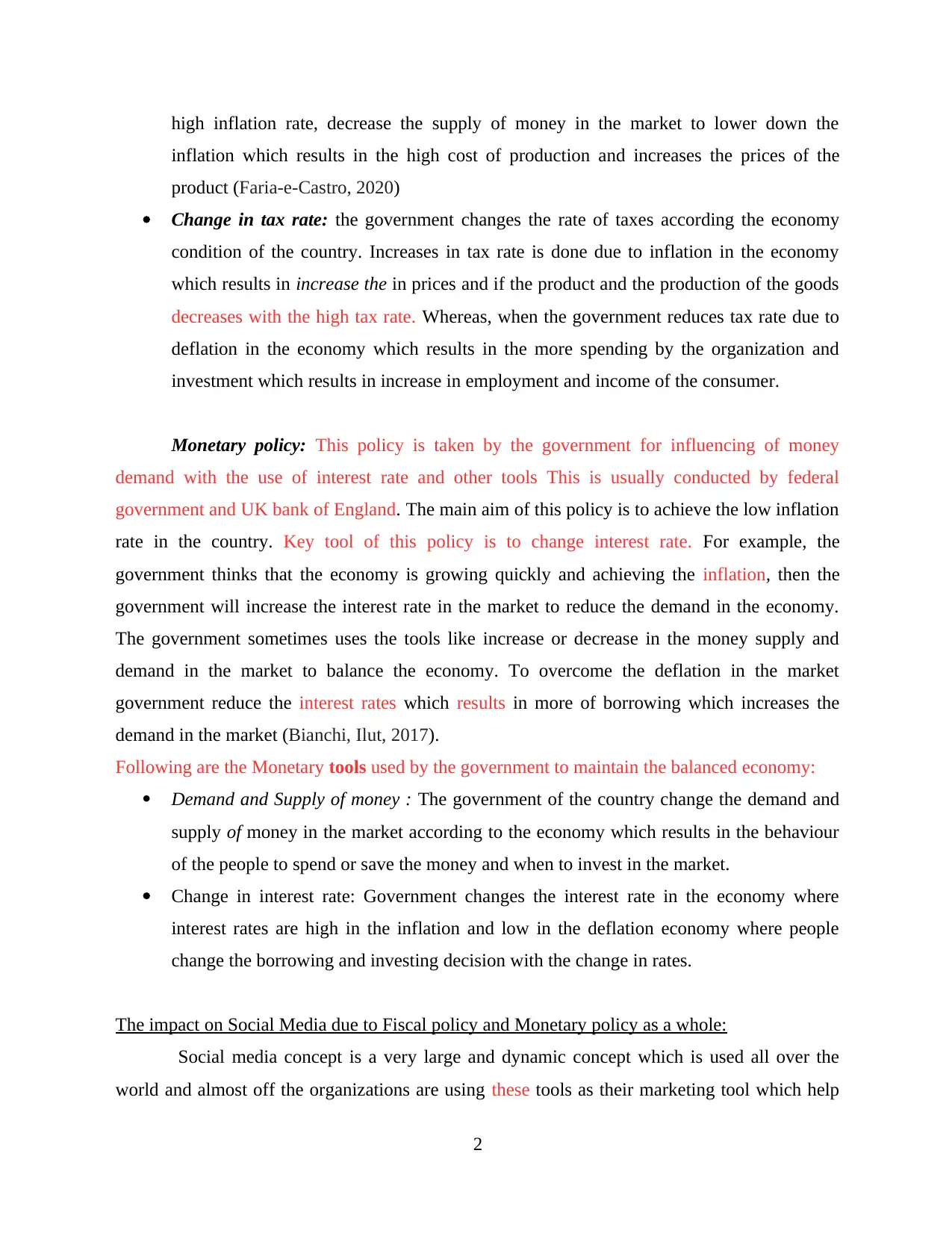
high inflation rate, decrease the supply of money in the market to lower down the
inflation which results in the high cost of production and increases the prices of the
product (Faria-e-Castro, 2020)
Change in tax rate: the government changes the rate of taxes according the economy
condition of the country. Increases in tax rate is done due to inflation in the economy
which results in increase the in prices and if the product and the production of the goods
decreases with the high tax rate. Whereas, when the government reduces tax rate due to
deflation in the economy which results in the more spending by the organization and
investment which results in increase in employment and income of the consumer.
Monetary policy: This policy is taken by the government for influencing of money
demand with the use of interest rate and other tools This is usually conducted by federal
government and UK bank of England. The main aim of this policy is to achieve the low inflation
rate in the country. Key tool of this policy is to change interest rate. For example, the
government thinks that the economy is growing quickly and achieving the inflation, then the
government will increase the interest rate in the market to reduce the demand in the economy.
The government sometimes uses the tools like increase or decrease in the money supply and
demand in the market to balance the economy. To overcome the deflation in the market
government reduce the interest rates which results in more of borrowing which increases the
demand in the market (Bianchi, Ilut, 2017).
Following are the Monetary tools used by the government to maintain the balanced economy:
Demand and Supply of money : The government of the country change the demand and
supply of money in the market according to the economy which results in the behaviour
of the people to spend or save the money and when to invest in the market.
Change in interest rate: Government changes the interest rate in the economy where
interest rates are high in the inflation and low in the deflation economy where people
change the borrowing and investing decision with the change in rates.
The impact on Social Media due to Fiscal policy and Monetary policy as a whole:
Social media concept is a very large and dynamic concept which is used all over the
world and almost off the organizations are using these tools as their marketing tool which help
2
inflation which results in the high cost of production and increases the prices of the
product (Faria-e-Castro, 2020)
Change in tax rate: the government changes the rate of taxes according the economy
condition of the country. Increases in tax rate is done due to inflation in the economy
which results in increase the in prices and if the product and the production of the goods
decreases with the high tax rate. Whereas, when the government reduces tax rate due to
deflation in the economy which results in the more spending by the organization and
investment which results in increase in employment and income of the consumer.
Monetary policy: This policy is taken by the government for influencing of money
demand with the use of interest rate and other tools This is usually conducted by federal
government and UK bank of England. The main aim of this policy is to achieve the low inflation
rate in the country. Key tool of this policy is to change interest rate. For example, the
government thinks that the economy is growing quickly and achieving the inflation, then the
government will increase the interest rate in the market to reduce the demand in the economy.
The government sometimes uses the tools like increase or decrease in the money supply and
demand in the market to balance the economy. To overcome the deflation in the market
government reduce the interest rates which results in more of borrowing which increases the
demand in the market (Bianchi, Ilut, 2017).
Following are the Monetary tools used by the government to maintain the balanced economy:
Demand and Supply of money : The government of the country change the demand and
supply of money in the market according to the economy which results in the behaviour
of the people to spend or save the money and when to invest in the market.
Change in interest rate: Government changes the interest rate in the economy where
interest rates are high in the inflation and low in the deflation economy where people
change the borrowing and investing decision with the change in rates.
The impact on Social Media due to Fiscal policy and Monetary policy as a whole:
Social media concept is a very large and dynamic concept which is used all over the
world and almost off the organizations are using these tools as their marketing tool which help
2
Paraphrase This Document
Need a fresh take? Get an instant paraphrase of this document with our AI Paraphraser
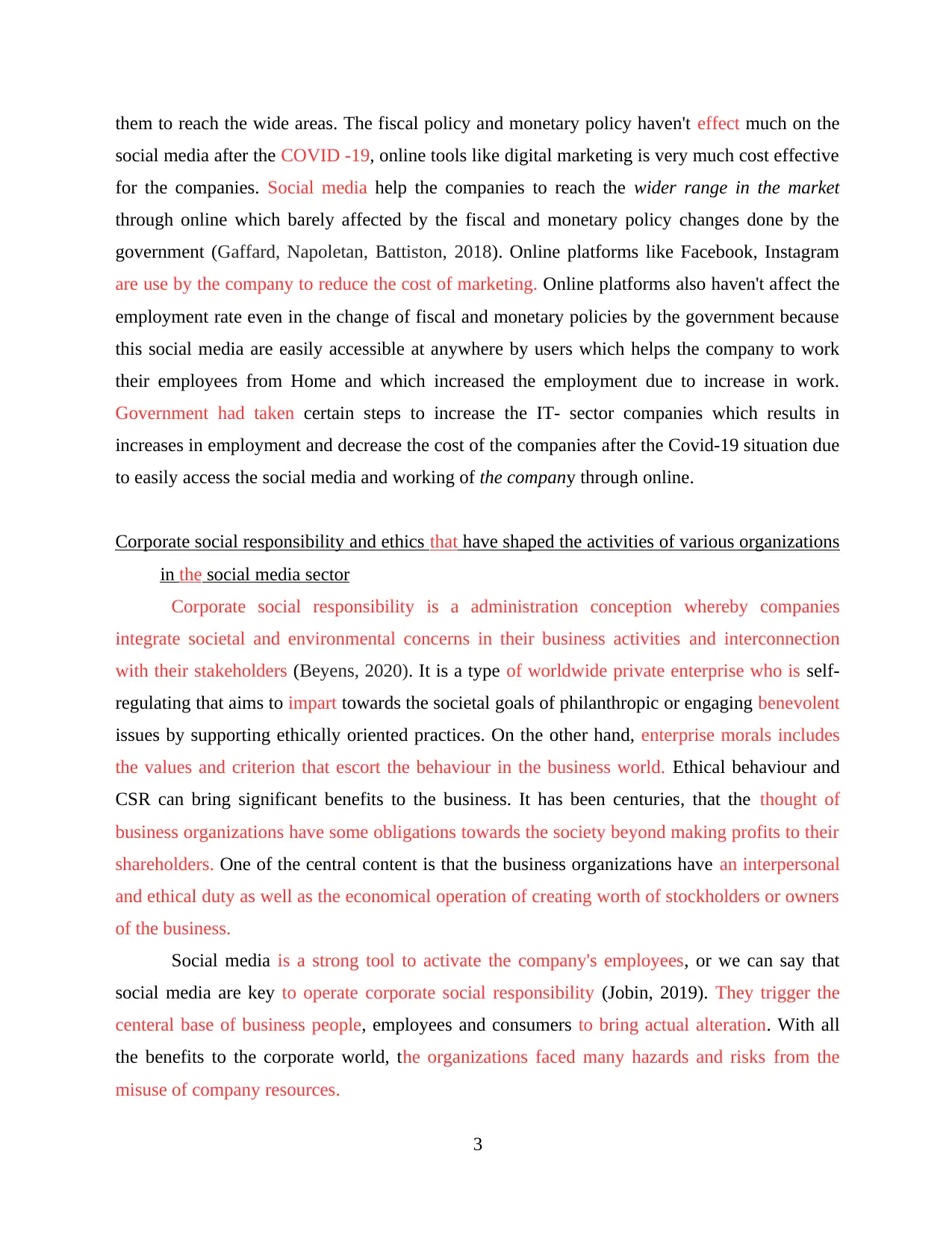
them to reach the wide areas. The fiscal policy and monetary policy haven't effect much on the
social media after the COVID -19, online tools like digital marketing is very much cost effective
for the companies. Social media help the companies to reach the wider range in the market
through online which barely affected by the fiscal and monetary policy changes done by the
government (Gaffard, Napoletan, Battiston, 2018). Online platforms like Facebook, Instagram
are use by the company to reduce the cost of marketing. Online platforms also haven't affect the
employment rate even in the change of fiscal and monetary policies by the government because
this social media are easily accessible at anywhere by users which helps the company to work
their employees from Home and which increased the employment due to increase in work.
Government had taken certain steps to increase the IT- sector companies which results in
increases in employment and decrease the cost of the companies after the Covid-19 situation due
to easily access the social media and working of the company through online.
Corporate social responsibility and ethics that have shaped the activities of various organizations
in the social media sector
Corporate social responsibility is a administration conception whereby companies
integrate societal and environmental concerns in their business activities and interconnection
with their stakeholders (Beyens, 2020). It is a type of worldwide private enterprise who is self-
regulating that aims to impart towards the societal goals of philanthropic or engaging benevolent
issues by supporting ethically oriented practices. On the other hand, enterprise morals includes
the values and criterion that escort the behaviour in the business world. Ethical behaviour and
CSR can bring significant benefits to the business. It has been centuries, that the thought of
business organizations have some obligations towards the society beyond making profits to their
shareholders. One of the central content is that the business organizations have an interpersonal
and ethical duty as well as the economical operation of creating worth of stockholders or owners
of the business.
Social media is a strong tool to activate the company's employees, or we can say that
social media are key to operate corporate social responsibility (Jobin, 2019). They trigger the
centeral base of business people, employees and consumers to bring actual alteration. With all
the benefits to the corporate world, the organizations faced many hazards and risks from the
misuse of company resources.
3
social media after the COVID -19, online tools like digital marketing is very much cost effective
for the companies. Social media help the companies to reach the wider range in the market
through online which barely affected by the fiscal and monetary policy changes done by the
government (Gaffard, Napoletan, Battiston, 2018). Online platforms like Facebook, Instagram
are use by the company to reduce the cost of marketing. Online platforms also haven't affect the
employment rate even in the change of fiscal and monetary policies by the government because
this social media are easily accessible at anywhere by users which helps the company to work
their employees from Home and which increased the employment due to increase in work.
Government had taken certain steps to increase the IT- sector companies which results in
increases in employment and decrease the cost of the companies after the Covid-19 situation due
to easily access the social media and working of the company through online.
Corporate social responsibility and ethics that have shaped the activities of various organizations
in the social media sector
Corporate social responsibility is a administration conception whereby companies
integrate societal and environmental concerns in their business activities and interconnection
with their stakeholders (Beyens, 2020). It is a type of worldwide private enterprise who is self-
regulating that aims to impart towards the societal goals of philanthropic or engaging benevolent
issues by supporting ethically oriented practices. On the other hand, enterprise morals includes
the values and criterion that escort the behaviour in the business world. Ethical behaviour and
CSR can bring significant benefits to the business. It has been centuries, that the thought of
business organizations have some obligations towards the society beyond making profits to their
shareholders. One of the central content is that the business organizations have an interpersonal
and ethical duty as well as the economical operation of creating worth of stockholders or owners
of the business.
Social media is a strong tool to activate the company's employees, or we can say that
social media are key to operate corporate social responsibility (Jobin, 2019). They trigger the
centeral base of business people, employees and consumers to bring actual alteration. With all
the benefits to the corporate world, the organizations faced many hazards and risks from the
misuse of company resources.
3
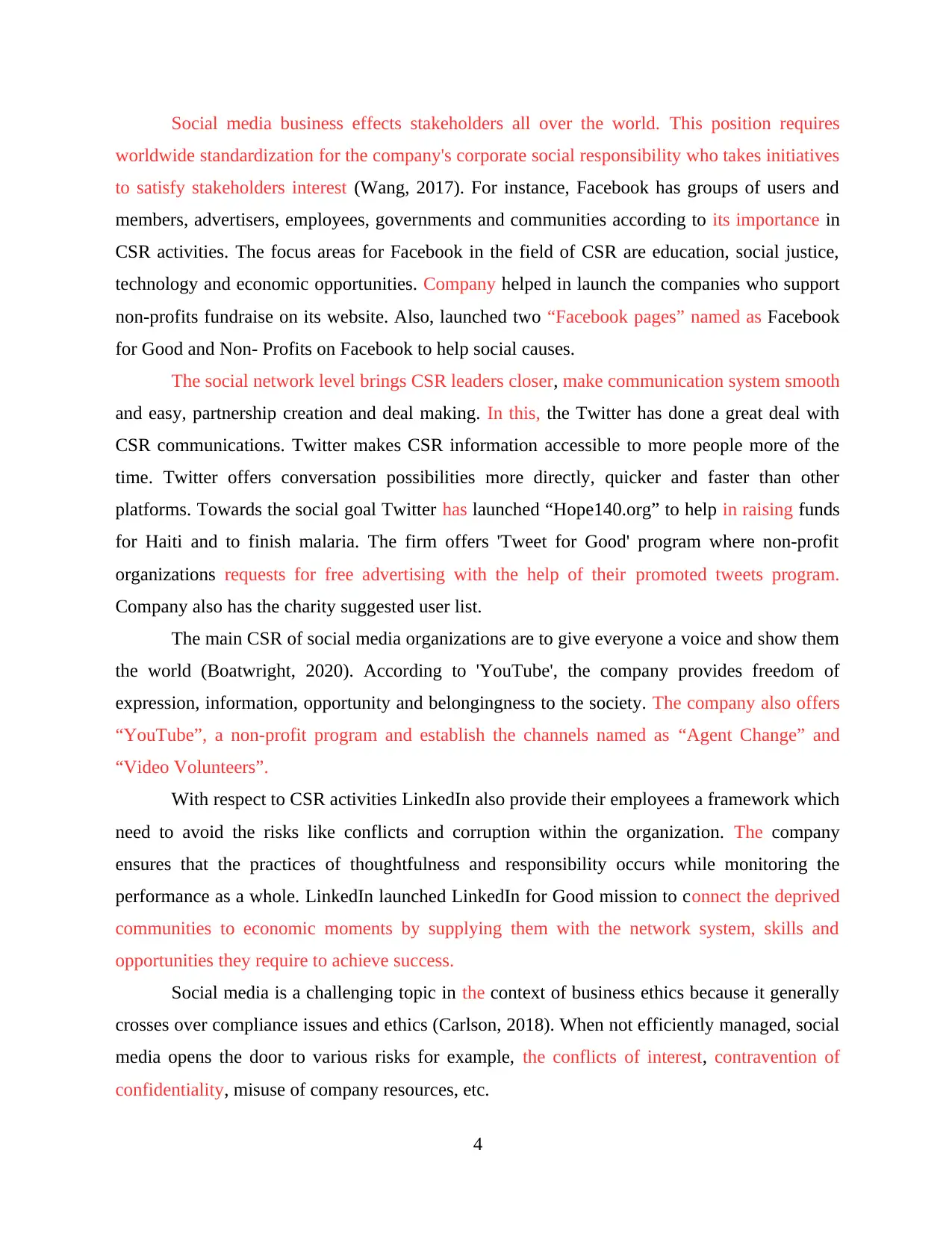
Social media business effects stakeholders all over the world. This position requires
worldwide standardization for the company's corporate social responsibility who takes initiatives
to satisfy stakeholders interest (Wang, 2017). For instance, Facebook has groups of users and
members, advertisers, employees, governments and communities according to its importance in
CSR activities. The focus areas for Facebook in the field of CSR are education, social justice,
technology and economic opportunities. Company helped in launch the companies who support
non-profits fundraise on its website. Also, launched two “Facebook pages” named as Facebook
for Good and Non- Profits on Facebook to help social causes.
The social network level brings CSR leaders closer, make communication system smooth
and easy, partnership creation and deal making. In this, the Twitter has done a great deal with
CSR communications. Twitter makes CSR information accessible to more people more of the
time. Twitter offers conversation possibilities more directly, quicker and faster than other
platforms. Towards the social goal Twitter has launched “Hope140.org” to help in raising funds
for Haiti and to finish malaria. The firm offers 'Tweet for Good' program where non-profit
organizations requests for free advertising with the help of their promoted tweets program.
Company also has the charity suggested user list.
The main CSR of social media organizations are to give everyone a voice and show them
the world (Boatwright, 2020). According to 'YouTube', the company provides freedom of
expression, information, opportunity and belongingness to the society. The company also offers
“YouTube”, a non-profit program and establish the channels named as “Agent Change” and
“Video Volunteers”.
With respect to CSR activities LinkedIn also provide their employees a framework which
need to avoid the risks like conflicts and corruption within the organization. The company
ensures that the practices of thoughtfulness and responsibility occurs while monitoring the
performance as a whole. LinkedIn launched LinkedIn for Good mission to connect the deprived
communities to economic moments by supplying them with the network system, skills and
opportunities they require to achieve success.
Social media is a challenging topic in the context of business ethics because it generally
crosses over compliance issues and ethics (Carlson, 2018). When not efficiently managed, social
media opens the door to various risks for example, the conflicts of interest, contravention of
confidentiality, misuse of company resources, etc.
4
worldwide standardization for the company's corporate social responsibility who takes initiatives
to satisfy stakeholders interest (Wang, 2017). For instance, Facebook has groups of users and
members, advertisers, employees, governments and communities according to its importance in
CSR activities. The focus areas for Facebook in the field of CSR are education, social justice,
technology and economic opportunities. Company helped in launch the companies who support
non-profits fundraise on its website. Also, launched two “Facebook pages” named as Facebook
for Good and Non- Profits on Facebook to help social causes.
The social network level brings CSR leaders closer, make communication system smooth
and easy, partnership creation and deal making. In this, the Twitter has done a great deal with
CSR communications. Twitter makes CSR information accessible to more people more of the
time. Twitter offers conversation possibilities more directly, quicker and faster than other
platforms. Towards the social goal Twitter has launched “Hope140.org” to help in raising funds
for Haiti and to finish malaria. The firm offers 'Tweet for Good' program where non-profit
organizations requests for free advertising with the help of their promoted tweets program.
Company also has the charity suggested user list.
The main CSR of social media organizations are to give everyone a voice and show them
the world (Boatwright, 2020). According to 'YouTube', the company provides freedom of
expression, information, opportunity and belongingness to the society. The company also offers
“YouTube”, a non-profit program and establish the channels named as “Agent Change” and
“Video Volunteers”.
With respect to CSR activities LinkedIn also provide their employees a framework which
need to avoid the risks like conflicts and corruption within the organization. The company
ensures that the practices of thoughtfulness and responsibility occurs while monitoring the
performance as a whole. LinkedIn launched LinkedIn for Good mission to connect the deprived
communities to economic moments by supplying them with the network system, skills and
opportunities they require to achieve success.
Social media is a challenging topic in the context of business ethics because it generally
crosses over compliance issues and ethics (Carlson, 2018). When not efficiently managed, social
media opens the door to various risks for example, the conflicts of interest, contravention of
confidentiality, misuse of company resources, etc.
4
⊘ This is a preview!⊘
Do you want full access?
Subscribe today to unlock all pages.

Trusted by 1+ million students worldwide
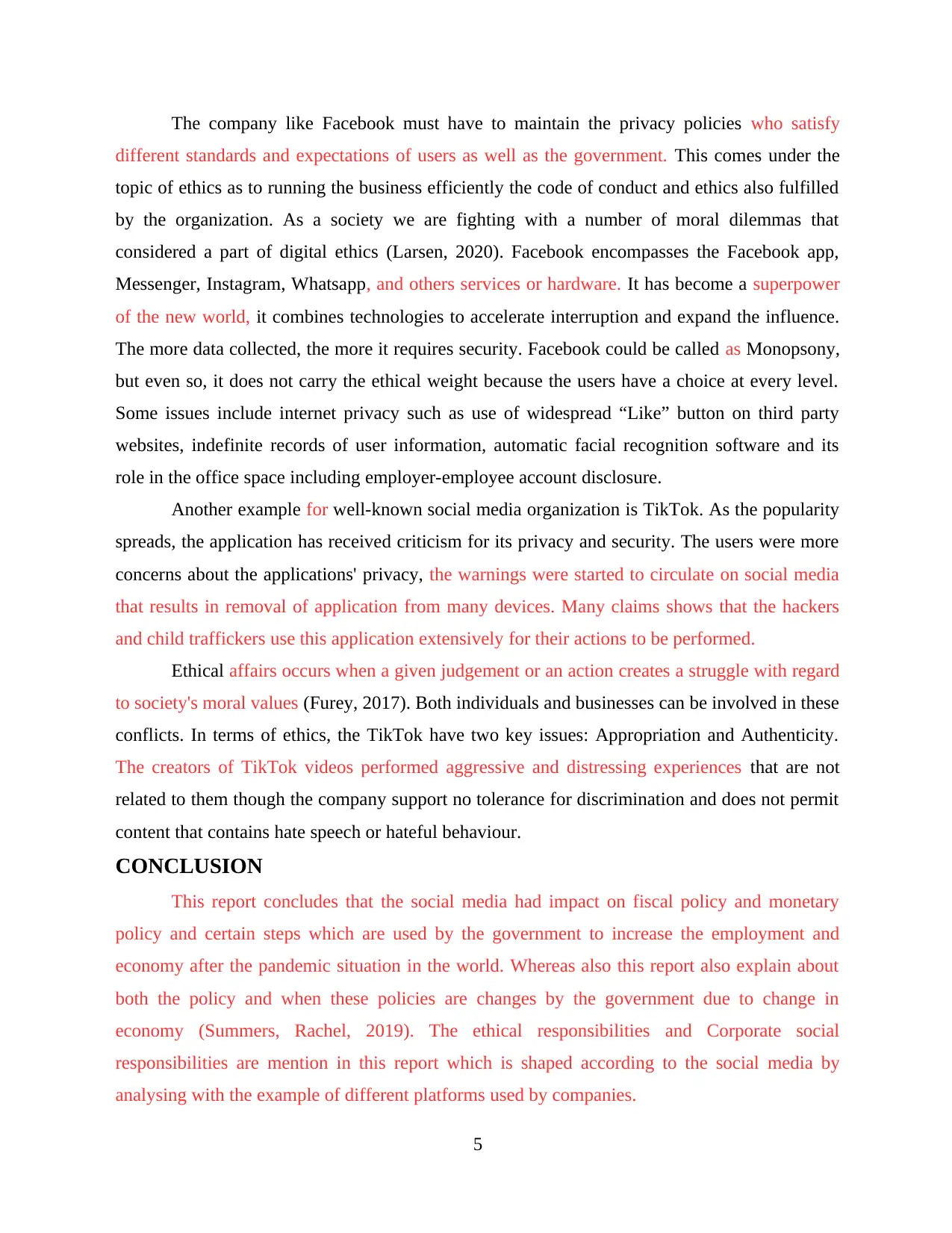
The company like Facebook must have to maintain the privacy policies who satisfy
different standards and expectations of users as well as the government. This comes under the
topic of ethics as to running the business efficiently the code of conduct and ethics also fulfilled
by the organization. As a society we are fighting with a number of moral dilemmas that
considered a part of digital ethics (Larsen, 2020). Facebook encompasses the Facebook app,
Messenger, Instagram, Whatsapp, and others services or hardware. It has become a superpower
of the new world, it combines technologies to accelerate interruption and expand the influence.
The more data collected, the more it requires security. Facebook could be called as Monopsony,
but even so, it does not carry the ethical weight because the users have a choice at every level.
Some issues include internet privacy such as use of widespread “Like” button on third party
websites, indefinite records of user information, automatic facial recognition software and its
role in the office space including employer-employee account disclosure.
Another example for well-known social media organization is TikTok. As the popularity
spreads, the application has received criticism for its privacy and security. The users were more
concerns about the applications' privacy, the warnings were started to circulate on social media
that results in removal of application from many devices. Many claims shows that the hackers
and child traffickers use this application extensively for their actions to be performed.
Ethical affairs occurs when a given judgement or an action creates a struggle with regard
to society's moral values (Furey, 2017). Both individuals and businesses can be involved in these
conflicts. In terms of ethics, the TikTok have two key issues: Appropriation and Authenticity.
The creators of TikTok videos performed aggressive and distressing experiences that are not
related to them though the company support no tolerance for discrimination and does not permit
content that contains hate speech or hateful behaviour.
CONCLUSION
This report concludes that the social media had impact on fiscal policy and monetary
policy and certain steps which are used by the government to increase the employment and
economy after the pandemic situation in the world. Whereas also this report also explain about
both the policy and when these policies are changes by the government due to change in
economy (Summers, Rachel, 2019). The ethical responsibilities and Corporate social
responsibilities are mention in this report which is shaped according to the social media by
analysing with the example of different platforms used by companies.
5
different standards and expectations of users as well as the government. This comes under the
topic of ethics as to running the business efficiently the code of conduct and ethics also fulfilled
by the organization. As a society we are fighting with a number of moral dilemmas that
considered a part of digital ethics (Larsen, 2020). Facebook encompasses the Facebook app,
Messenger, Instagram, Whatsapp, and others services or hardware. It has become a superpower
of the new world, it combines technologies to accelerate interruption and expand the influence.
The more data collected, the more it requires security. Facebook could be called as Monopsony,
but even so, it does not carry the ethical weight because the users have a choice at every level.
Some issues include internet privacy such as use of widespread “Like” button on third party
websites, indefinite records of user information, automatic facial recognition software and its
role in the office space including employer-employee account disclosure.
Another example for well-known social media organization is TikTok. As the popularity
spreads, the application has received criticism for its privacy and security. The users were more
concerns about the applications' privacy, the warnings were started to circulate on social media
that results in removal of application from many devices. Many claims shows that the hackers
and child traffickers use this application extensively for their actions to be performed.
Ethical affairs occurs when a given judgement or an action creates a struggle with regard
to society's moral values (Furey, 2017). Both individuals and businesses can be involved in these
conflicts. In terms of ethics, the TikTok have two key issues: Appropriation and Authenticity.
The creators of TikTok videos performed aggressive and distressing experiences that are not
related to them though the company support no tolerance for discrimination and does not permit
content that contains hate speech or hateful behaviour.
CONCLUSION
This report concludes that the social media had impact on fiscal policy and monetary
policy and certain steps which are used by the government to increase the employment and
economy after the pandemic situation in the world. Whereas also this report also explain about
both the policy and when these policies are changes by the government due to change in
economy (Summers, Rachel, 2019). The ethical responsibilities and Corporate social
responsibilities are mention in this report which is shaped according to the social media by
analysing with the example of different platforms used by companies.
5
Paraphrase This Document
Need a fresh take? Get an instant paraphrase of this document with our AI Paraphraser
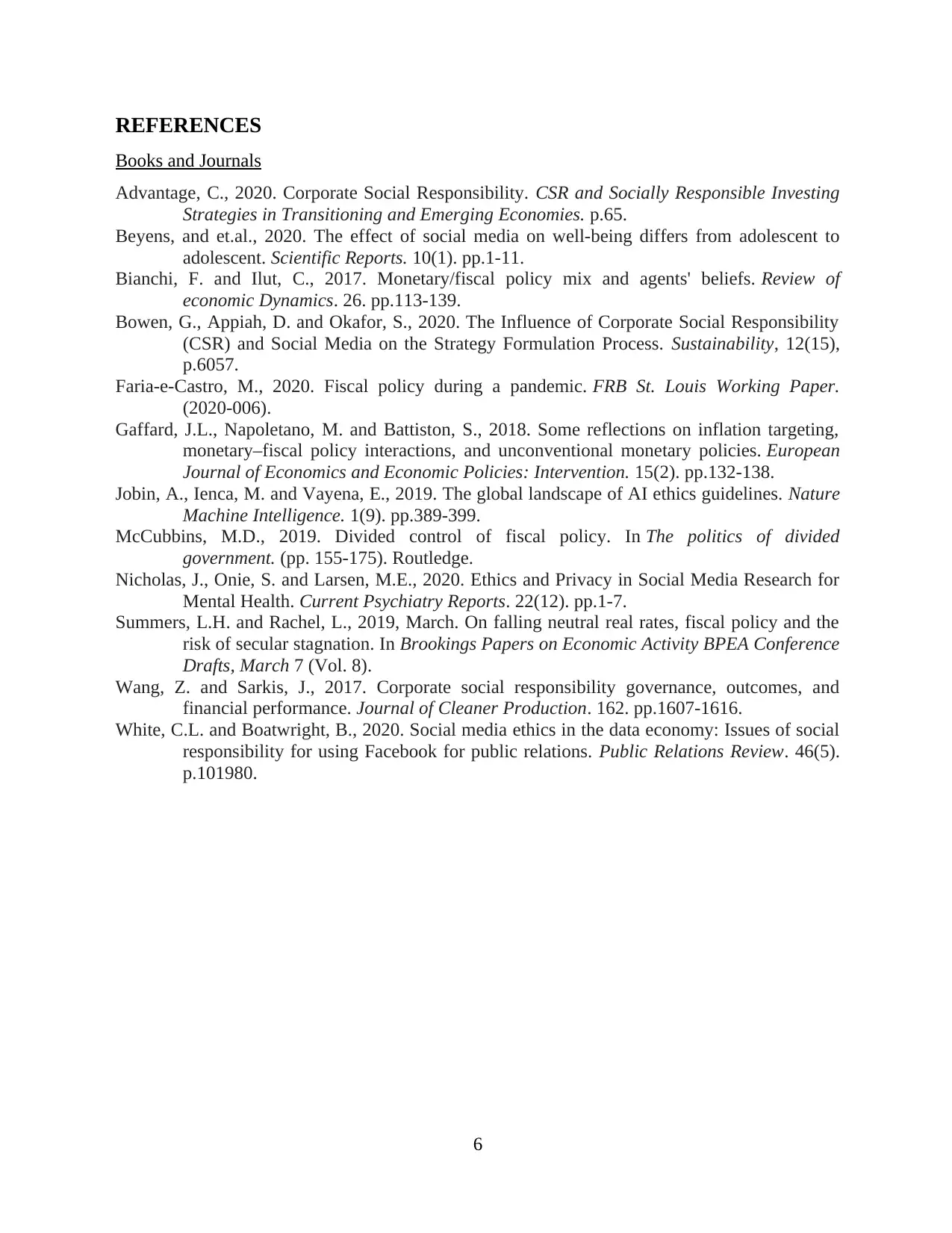
REFERENCES
Books and Journals
Advantage, C., 2020. Corporate Social Responsibility. CSR and Socially Responsible Investing
Strategies in Transitioning and Emerging Economies. p.65.
Beyens, and et.al., 2020. The effect of social media on well-being differs from adolescent to
adolescent. Scientific Reports. 10(1). pp.1-11.
Bianchi, F. and Ilut, C., 2017. Monetary/fiscal policy mix and agents' beliefs. Review of
economic Dynamics. 26. pp.113-139.
Bowen, G., Appiah, D. and Okafor, S., 2020. The Influence of Corporate Social Responsibility
(CSR) and Social Media on the Strategy Formulation Process. Sustainability, 12(15),
p.6057.
Faria-e-Castro, M., 2020. Fiscal policy during a pandemic. FRB St. Louis Working Paper.
(2020-006).
Gaffard, J.L., Napoletano, M. and Battiston, S., 2018. Some reflections on inflation targeting,
monetary–fiscal policy interactions, and unconventional monetary policies. European
Journal of Economics and Economic Policies: Intervention. 15(2). pp.132-138.
Jobin, A., Ienca, M. and Vayena, E., 2019. The global landscape of AI ethics guidelines. Nature
Machine Intelligence. 1(9). pp.389-399.
McCubbins, M.D., 2019. Divided control of fiscal policy. In The politics of divided
government. (pp. 155-175). Routledge.
Nicholas, J., Onie, S. and Larsen, M.E., 2020. Ethics and Privacy in Social Media Research for
Mental Health. Current Psychiatry Reports. 22(12). pp.1-7.
Summers, L.H. and Rachel, L., 2019, March. On falling neutral real rates, fiscal policy and the
risk of secular stagnation. In Brookings Papers on Economic Activity BPEA Conference
Drafts, March 7 (Vol. 8).
Wang, Z. and Sarkis, J., 2017. Corporate social responsibility governance, outcomes, and
financial performance. Journal of Cleaner Production. 162. pp.1607-1616.
White, C.L. and Boatwright, B., 2020. Social media ethics in the data economy: Issues of social
responsibility for using Facebook for public relations. Public Relations Review. 46(5).
p.101980.
6
Books and Journals
Advantage, C., 2020. Corporate Social Responsibility. CSR and Socially Responsible Investing
Strategies in Transitioning and Emerging Economies. p.65.
Beyens, and et.al., 2020. The effect of social media on well-being differs from adolescent to
adolescent. Scientific Reports. 10(1). pp.1-11.
Bianchi, F. and Ilut, C., 2017. Monetary/fiscal policy mix and agents' beliefs. Review of
economic Dynamics. 26. pp.113-139.
Bowen, G., Appiah, D. and Okafor, S., 2020. The Influence of Corporate Social Responsibility
(CSR) and Social Media on the Strategy Formulation Process. Sustainability, 12(15),
p.6057.
Faria-e-Castro, M., 2020. Fiscal policy during a pandemic. FRB St. Louis Working Paper.
(2020-006).
Gaffard, J.L., Napoletano, M. and Battiston, S., 2018. Some reflections on inflation targeting,
monetary–fiscal policy interactions, and unconventional monetary policies. European
Journal of Economics and Economic Policies: Intervention. 15(2). pp.132-138.
Jobin, A., Ienca, M. and Vayena, E., 2019. The global landscape of AI ethics guidelines. Nature
Machine Intelligence. 1(9). pp.389-399.
McCubbins, M.D., 2019. Divided control of fiscal policy. In The politics of divided
government. (pp. 155-175). Routledge.
Nicholas, J., Onie, S. and Larsen, M.E., 2020. Ethics and Privacy in Social Media Research for
Mental Health. Current Psychiatry Reports. 22(12). pp.1-7.
Summers, L.H. and Rachel, L., 2019, March. On falling neutral real rates, fiscal policy and the
risk of secular stagnation. In Brookings Papers on Economic Activity BPEA Conference
Drafts, March 7 (Vol. 8).
Wang, Z. and Sarkis, J., 2017. Corporate social responsibility governance, outcomes, and
financial performance. Journal of Cleaner Production. 162. pp.1607-1616.
White, C.L. and Boatwright, B., 2020. Social media ethics in the data economy: Issues of social
responsibility for using Facebook for public relations. Public Relations Review. 46(5).
p.101980.
6
1 out of 8
Related Documents
Your All-in-One AI-Powered Toolkit for Academic Success.
+13062052269
info@desklib.com
Available 24*7 on WhatsApp / Email
![[object Object]](/_next/static/media/star-bottom.7253800d.svg)
Unlock your academic potential
Copyright © 2020–2026 A2Z Services. All Rights Reserved. Developed and managed by ZUCOL.





